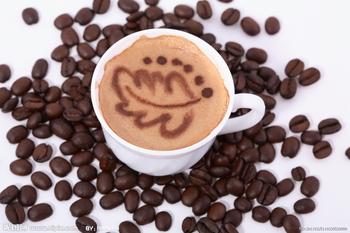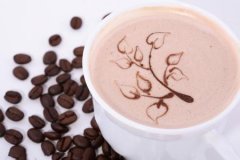The Chinese love tea, but we made them love coffee.
"The Chinese love tea, but we got them to love coffee," Starbucks chairman Howard Schultz said.

In fact, the Chinese are slowly embracing the coffee-drinking lifestyle. Starbucks opened its first store in Beijing's World Trade Center in 1999, but China has become Starbucks 'fourth largest overseas market, with about 710 stores in Greater China. In the last two years, McDonald's and Kentucky Fried Chicken have joined the coffee wars. China's imports of raw coffee jumped 41.37 percent year-on-year to 8790 tons in the first four months of this year, driven by rising demand for coffee.
Even so, enjoying coffee in China is still not something ordinary people can take lightly, and the bitterness of coffee is somewhat unfamiliar to Chinese who are accustomed to drinking tea. Mr. Hu, who works in a car factory in Beijing, is 35 years old this year. In an interview with a reporter from China Sankei Shimbun, he was extremely calm about whether to go to a cafe to drink coffee: "Drink coffee?" It costs dozens of yuan a cup. It's better to buy a chicken soup. It's more nutritious!"
But the burgeoning middle class saw coffee as a status symbol. At Starbucks Cafe in Sanlitun, Beijing, China Sanjing Shimbun interviewed several people enjoying coffee at random. "People started drinking coffee because they thought it was cool," Li, 23, an administrator at an English-language educational institution, told reporters. This is a declaration. They think coffee is elegant and everyone is afraid of being seen as old-fashioned." Zhang Hui, a 28-year-old computer analyst, was heading out the door with a steaming paper cup in her hand and a LV handbag dangling beside her. She said: "When I first drank coffee a few years ago, I thought it tasted terrible. Later, I didn't want to drink anymore, but my boyfriend liked it, so I got used to drinking with him."
Miss Zhang, who works in the media, gives a very incisive summary. Miss Zhang said that she did not have a fever for coffee before, occasionally sitting in coffee shops, mostly accompanied by juice, never considering those expensive coffee,"for us salaried people, 30 yuan a cup of coffee, equivalent to two days of food expenses." If this is a fixed consumption, I believe most people can't afford it." In her view, most coffee shops sell only an elegant atmosphere, not coffee itself."This is the lifestyle of rich people, while ordinary citizens can only be spectators."
From this point of view, most of the Chinese people are still positioned in a luxurious and avant-garde lifestyle when they look at coffee. Relevant surveys show that at present, the average person in mainland China drinks ready-to-drink coffee 0.11 times a year, which is not only far from Japan's 107 times, but also much lower than Taiwan's 35 times, Thailand's 8.7 times and Hong Kong's 4.9 times. Retail coffee consumption in China is expected to increase by more than 35 per cent over the next four years and could reach 45900 tonnes by 2014, Euromonitor reports.
In fact, coffee represents luxury avantgarde perhaps only because of its imported nature. In America, where it originated, coffee is a necessity. A cup of coffee a day is essential for Americans. For them, coffee has become a habit, a culture, and Chinese tea culture on a par.
I believe that one day, Chinese people will also be able to treat coffee as a part of life rather than a luxury.
Important Notice :
前街咖啡 FrontStreet Coffee has moved to new addredd:
FrontStreet Coffee Address: 315,Donghua East Road,GuangZhou
Tel:020 38364473
- Prev

Raw materials and methods of coffee cake mocha coffee mousse
Coffee mousse has a strong coffee flavor and cocoa powder has a mellow chocolate flavor, both of which are a little bitter. In order to neutralize this taste, I added some powdered sugar on top. The delicious mocha mousse cup not only appeases the cravings but also refreshes you. It's also a good choice to eat coffee in another way. Put chocolate cake on the bottom of the mousse and sprinkle some on it.
- Next

Local coffee cultures with very different common sense of coffee
Coffee culture is no exception. Americans like to drink coffee casually and without scruples; American coffee culture has no European sentiment or Arab fastidiousness; the connotation of American coffee culture is to drink freely, comfortably, self-and detached. The United States is a young and vibrant country, and any form of culture in this country is like itself.
Related
- Beginners will see the "Coffee pull flower" guide!
- What is the difference between ice blog purified milk and ordinary milk coffee?
- Why is the Philippines the largest producer of crops in Liberia?
- For coffee extraction, should the fine powder be retained?
- How does extracted espresso fill pressed powder? How much strength does it take to press the powder?
- How to make jasmine cold extract coffee? Is the jasmine + latte good?
- Will this little toy really make the coffee taste better? How does Lily Drip affect coffee extraction?
- Will the action of slapping the filter cup also affect coffee extraction?
- What's the difference between powder-to-water ratio and powder-to-liquid ratio?
- What is the Ethiopian local species? What does it have to do with Heirloom native species?

